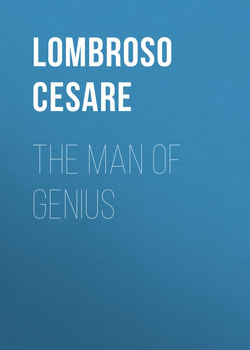The Man of Genius

Реклама. ООО «ЛитРес», ИНН: 7719571260.
Оглавление
Lombroso Cesare. The Man of Genius
PREFACE
PART I. THE CHARACTERISTICS OF GENIUS
CHAPTER I. History of the Problem
CHAPTER II. Genius and Degeneration
CHAPTER III. Latent Forms of Neurosis and Insanity in Genius
CHAPTER IV. Genius and Insanity
PART II. THE CAUSES OF GENIUS
CHAPTER I. Meteorological Influences on Genius
CHAPTER II. Climatic Influences on Genius
CHAPTER III. The Influence of Race and Heredity on Genius and Insanity
CHAPTER IV. The Influence of Disease on Genius
CHAPTER V. The Influence of Civilization and of Opportunity
PART III. GENIUS IN THE INSANE
CHAPTER I. Insane Genius in Literature
CHAPTER II. Art in the Insane
CHAPTER III. Literary and Artistic Mattoids
CHAPTER IV. Political and Religious Lunatics and Mattoids
PART IV. SYNTHESIS. THE DEGENERATIVE PSYCHOSIS OF GENIUS
CHAPTER I. Characteristics of Insane Men of Genius
CHAPTER II. Analogy of Sane to Insane Genius
CHAPTER III. The Epileptoid Nature of Genius
CHAPTER IV. Sane Men of Genius
CHAPTER V. CONCLUSIONS
APPENDIX. POETRY AND THE INSANE
Отрывок из книги
IT is a sad mission to cut through and destroy with the scissors of analysis the delicate and iridescent veils with which our proud mediocrity clothes itself. Very terrible is the religion of truth. The physiologist is not afraid to reduce love to a play of stamens and pistils, and thought to a molecular movement. Even genius, the one human power before which we may bow the knee without shame, has been classed by not a few alienists as on the confines of criminality, one of the teratologic forms of the human mind, a variety of insanity.
This impious profanation is not, however, altogether the work of doctors, nor is it the fruit of modern scepticism. The great Aristotle, once the father, and still the friend, of philosophers, observed that, under the influence of congestion of the head, “many persons become poets, prophets, and sybils, and, like Marcus the Syracusan, are pretty good poets while they are maniacal; but when cured can no longer write verse.”5 And again, “Men illustrious in poetry, politics, and arts, have often been melancholic and mad, like Ajax, or misanthropic, like Bellerophon. Even in modern times such characters have been noted in Socrates, Empedocles, Plato, and in many others, especially poets.”6
.....
Chopin during the last years of his life was possessed by a melancholy which went as far as insanity. An abandoned convent in Spain filled his imagination with phantoms and terrors. One day G. Sand and her son were late in returning from a walk. Chopin began to imagine, and finally believed, that they were dead; then he saw himself dead, drowned in a lake, and drops of frozen water fell upon his breast. They were real drops of rain falling upon him from the roof of the ruin, but he did not perceive this, even when George Sand pointed it out. Some trifling annoyance affected him more than a great and real misfortune. A crumpled petal, a fly, made him weep.102
Cavour from youth believed himself deprived of domestic affections. He saw no friends around; he saw above him no ideal to realise; he found himself alone.103 His condition reached such a point that, to avoid greater evils and to leave an insipid life, he wished to kill himself. He hesitated only because he was doubtful about the morality of suicide. “But, while this doubt exists, it is best for me to imitate Hamlet. I will not kill myself: no, but I will put up earnest prayers to heaven to send me a rapid consumption which may carry me off to the other world.” At a very youthful age he sometimes gave himself up to strange attacks of bad temper. One day, at the Castle of Diluzers, at Balangero, he threw himself into so violent a rage on being asked to study that he wished to kill himself with a knife and throw himself from the window. These attacks were very frequent but of brief duration.104 When the hopes of war raised by the words of Napoleon III. to Baron Hübner seemed suddenly to give place in the Emperor’s mind to thoughts of peace, Cavour was carried away by such agitation that some extreme resolution was apprehended. This is confirmed by Castelli, who went to his house and found him alone in his room. He had burnt various papers, and given orders that no one should be admitted. The danger was plain. He looked fixedly at Castelli, who spoke a few calm words calculated to affect him, and then burst into tears. Cavour rose, embraced him convulsively, took a few steps distractedly about the room, and then said slowly: “Be at rest; we will brave everything, and always together.” Castelli ran to reassure his friends, but the danger had been very grave.105
.....